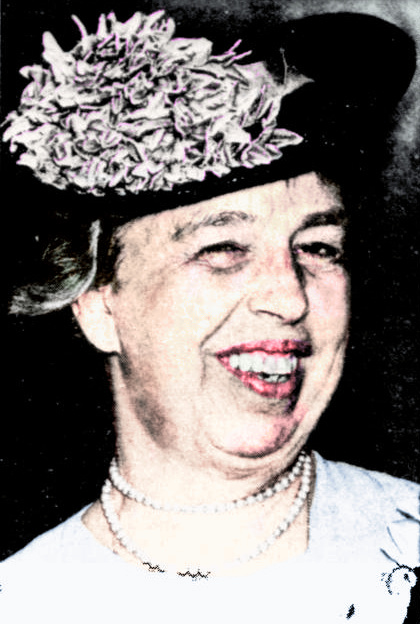
MY DAY
By Eleanor Roosevelt
November 1, 1940
St. Johnsbury, Vt., Thursday –
The farmhouse in which the Cutters live in Limerick, Maine, is over a hundred years old and they have had to modernize it in many ways. However, one thing about it is not modern and I like it. Instead of a small bathroom where you could not “swing a cat” I took my bath and dressed yesterday morning in a room with an open fireplace. Do you know anything more luxurious than that?
We had listened the night before to Mr. Joseph Kennedy’s speech. Everybody on the farm had done a good day’s work, and we had spent a long day motoring, so we retired to nine good solid hours of sleep.
After shaking hands with the nice Maine men who are working on an addition to the barn, we left Limerick yesterday morning to motor to Colby College, Waterville, Maine. Mrs. Cutter drove out to the nearest crossroads to introduce us to two of her neighbors and then we were on our way.
Everything went smoothly until just before we hit Waterville, where we crossed a small bridge and looked for a police escort which we were told would be on hand to meet us. We saw none, but a car stopped ahead and a nice young man got out and looked around with curiosity. We thought he might be looking for us, so we drove up beside him and asked. He disclaimed any interest in us, but did tell us how to get to the next bridge, where our police escort would probably be waiting.
Sure enough, when we crossed the bridge, the police car started out ahead of us and we reached President Johnson’s house a little after 12:00. President and Mrs. Johnson have been most kind and cordial, though their lives have been complicated by the endless telegrams and telephone calls which have followed us.
Colby College is an old college and though it originally owned a great deal of land, a right of way was given to the railroad straight through the campus. This now makes for many difficulties. The citizens of Waterville have given the college a new and very lovely site on Mayflower Hill. Some of the buildings are already up and are delightful. The model of the whole plan shows one what the dream is for the future, and I think it must be very exciting to work on a new institution of this kind.
We enjoyed a small luncheon with President and Mrs. Johnson and the visit to the new campus, and then a reception was held for an hour and a half. Many children came in and one little boy, I am sure, will someday be a really good organizer. He kept bringing up his classmates and as he introduced them, he said:
This is Mary Jones, she is in the first grade.
Then he would push her on and go to fetch others.
We dined at Foss Hall with the women’s division of the college. At 8:00, I spoke in the Senior High School Auditorium and a forum discussion followed.
We left Waterville at 7:30 this morning and drove through the lovely northern part of Maine and New Hampshire, coming down into Massachusetts to spend the night at Deerfield.